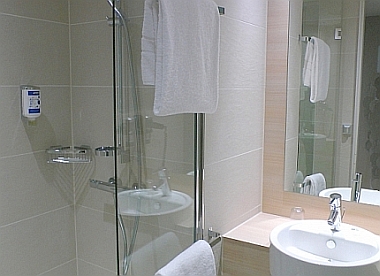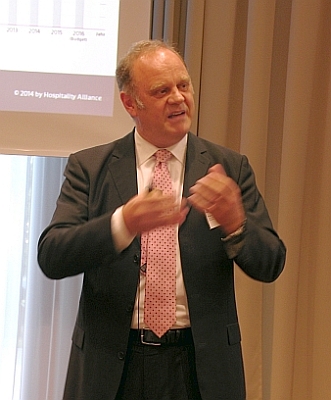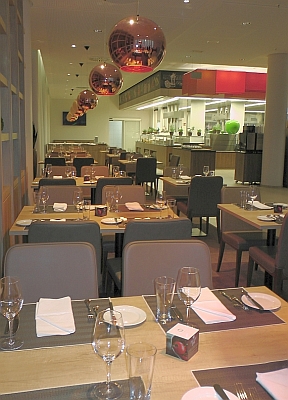"Green Hotels" workshop: How sustainability will find acceptance
 |
|
| Towels and dispensers, challenging the housekeeping. |
Munich (July 29, 2016). There are already several sustainability certificates throughout the hotel industry. But how are they being put into practice in everyday business and how do guests react to them? Frank Oettinger, Vice President Operations & Franchise H-Hotels, addressed certification at the first "Green Hotels – Nachhaltigkeitszertifikate für Hotelimmobilien" ("Green Hotels – Sustainability certificates for hotels") expert symposium on June 22, 2016, at Ramada Hotel & Conference Center Messe Muenchen from an operator's view – providing profound examples that actively involve both employees and guests.
International sustainability seals – LEED (Leadership in Energy and Environmental Design), BREEAM (Building Research Establishment Environmental Assessment Method), and the seal of quality of Deutsche Gesellschaft fuer Nachhaltiges Bauen (DGNB) – have taken control in the real estate world in the meantime. The best example for this is the Ramada/H2 hotel next to the Munich trade fair. The participants were able to take a look at the hotel's "green details" themselves. "A certification is not as transparent for guests as sustainability in practice," says Frank Oettinger of H-Hotels knowingly.
In a quite lively talk, he explained how the roughly 60 hotels of the H-Hotel Group put sustainability into practice in everyday business based on a few practical examples. Not only do these details make employees feel good, but they are also always perceived positively by guests.
1,500 loads of laundry saved
H-Hotels, which includes the brands H4, H2 and H+, do without table linen in F&B areas entirely – as a consequent measure to save resources. In this way, the Ramada/H2 Hotel at the Munich trade fair saves 40,000 tablecloths (corresponding to 1,500 washing machine loads per year) as well as transportation, detergents and bleachers.
 |
|
| Frank Oettinger: Train the staff! |
When it comes to cleaning the hotels including the back of the house, the group trusts in environmentally friendly cleaning agents and signed corresponding agreements with suppliers. By means of a certificate, they guarantee that they are neither using polluting agents nor supplying the hotels with such agents. Inside the hotels themselves, automatic dosing devices ensure efficient usage preventing waste. "But it is also important that our cleaning staff, whether internal or external, are made aware of the issue," explains Oettinger. "Only by constant training will you adapt to energy-saving behaviour."
And it is exactly this type of sensitiveness with respect to saving resources the hotel group wishes to convey to its employees by means of regular training. Among other things, this training focuses on saving energy: although the power is active during the cleaning process, air conditioning is deactivated. During the summer period, blackouts are closed while meeting and conference rooms are unused in order to avoid excessive use of air conditioning. All aerators and flow controllers are checked on a regular basis.
"We also frequently check our hotels' energy statistics and water consumption values. Thanks to the comparison with previous years' figures, we were able to learn that the pool of one of the hotels had a tiny leak, for example," says Oettinger describing the optimisation measures.
Change the laundry or not?
If you believe only employees are encouraged to use resources in a sustainable way, you will be taught a lesson by H-Hotels. We do without unnecessary amenities guests actually do not need, for example in the bathroom. Here, shower gel, shampoo and soap are only available via a wall-mounted dispenser. "These can be refilled again and again without harming the environment," explains Frank Oettinger. "In this way, we save about 200,000 small cosmetic bottles per year at 70 percent occupancy." Those in need of a nail file and similar accessories can turn to the reception. "There hasn’t been any negative feedback on this."
 |
|
| H2 does not allow table clothes any more. / photos: map |
When it comes to towels and bed linen, guests have a choice: if they are on a short trip, they do not need to have them changed on a daily basis. If they still want them changed, they simply have to display their exchange card in a way it can be easily seen – done. "This still running pilot project is highly accepted among the guests, but our multi-cultural employees sometimes struggle," says the operator with a smile. "If a towel was put on the bathtub and not on the holder, many cleaners tend to replace it. Although the card does not request it."
Pig buckets only half-full
The hotels' F&B areas are based on the premise "less pomp – more easiness". Whenever possible, unnecessary single packaging is avoided in favour of big packs. Small honey pots, light cream packs or sugar bags have been banned. Jam is served in glasses, honey in dispensers, and cereals in big packs. Single packaging is solely used when it comes to aesthetic and hygienic reasons, e.g. for butter, margarine, or nougat cream.
Moreover, service employees fill the displays and buffets solely based on the actual need. "About 1.3 billion tons of food are destroyed every year. In order to counteract this, we carry out menu analyses at each hotel every month," explains Oettinger. "In this way, we find out, which meals are consumed most often and are able to calculate the required quantities."
Concerning the employees behind the scene, participating in campaigns like "United Against the Waste" was a "rather wholesome remedy". Here, glass containers are placed to put in food waste or broken dishes. "The 'pig buckets', as they were called earlier, have been only half-full since. I think that you can only understand what you see and feel!" Thanks to such measures it was possible to reduce the costs of foods and materials drastically.
"Such practical examples clearly show that these small details of everyday business can already contribute to sustainability," concludes Frank Oettinger. But only one thing mattered: sustainability in practice should never let guests feel any restrictions on comfort or service, but needs to be integrated in an active way. / KG
To print this article you have to be registered and logged in for newsletter, visitor or subscription.





